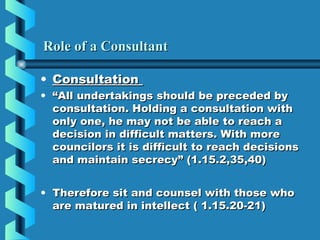Kautilya's Arthashastra for corporates
- 1. Management Practices from ‘Kautilya’s Arthashastra’ (Written by Chanakya, The world’s first Management Guru)
- 2. Who was Chanakya ?Who was Chanakya ? • Born in 3 B.C.Born in 3 B.C. • Vishugupta – Kautilya – ChanakyaVishugupta – Kautilya – Chanakya • Pulled down Nanda DynastyPulled down Nanda Dynasty • King maker – Chandragupta MauryaKing maker – Chandragupta Maurya • Responsible for the defeat ofResponsible for the defeat of Alexander in IndiaAlexander in India • Kautilya’s Arthashastra & ChanakyaKautilya’s Arthashastra & Chanakya Niti – Documented towards the end ofNiti – Documented towards the end of his lifehis life
- 3. Kautilya’s ArthashastraKautilya’s Arthashastra • Written in SamskritWritten in Samskrit • Contains 15 books, 150 chaptersContains 15 books, 150 chapters and 6000 sutras (shlokas)and 6000 sutras (shlokas) • Covers over 180 topics. KnownCovers over 180 topics. Known as a Book of Economics, stateas a Book of Economics, state craft, Management, warfare,craft, Management, warfare, strategy etcstrategy etc • It’s a Book of ‘TotalIt’s a Book of ‘Total Management’Management’
- 4. Management Topics in ArthashastraManagement Topics in Arthashastra • Principles ofPrinciples of ManagementManagement • ManagementManagement EducationEducation • AccountingAccounting systemssystems • CorporateCorporate GovernanceGovernance • Time ManagementTime Management • Leadership SkillsLeadership Skills • ContractsContracts • Selection ofSelection of EmployeesEmployees • ConsultingConsulting • StrategicStrategic ManagementManagement • HandlingHandling competitioncompetition • Expansion ofExpansion of Territory etcTerritory etc
- 5. Sample of Verses related to Management Topics in ‘Kautilya’s Arthashastra’
- 6. Definition and the Basic elements of ManagementDefinition and the Basic elements of Management 1.1. The means of starting undertakingsThe means of starting undertakings (assignments/ projects)(assignments/ projects) 2.2. The excellence of men andThe excellence of men and materialsmaterials 3.3. Deciding suitable place and timeDeciding suitable place and time 4.4. Provision against failureProvision against failure 5.5. Accomplishment of the workAccomplishment of the work • (1.15.42)(1.15.42)
- 7. Wealth CreationWealth Creation • ““Wealth will slip away from theWealth will slip away from the foolish person, who continuouslyfoolish person, who continuously consults the stars; for wealth isconsults the stars; for wealth is the star of wealth; what will thethe star of wealth; what will the stars do? Capable men willstars do? Capable men will certainly secure wealth at leastcertainly secure wealth at least after a hundred trails” ( 9.4.26)after a hundred trails” ( 9.4.26)
- 8. Corporate GovernanceCorporate Governance • ““In the happiness of theIn the happiness of the subjects lies the benefit of thesubjects lies the benefit of the king and in what is beneficial toking and in what is beneficial to the subjects is his own benefit”the subjects is his own benefit” – (1.19.34)– (1.19.34)
- 9. Selection of EmployeesSelection of Employees Appointment of traineesAppointment of trainees A ‘trainable’ person is the one who has theA ‘trainable’ person is the one who has the following qualitiesfollowing qualities 1.Desire to learn1.Desire to learn 2.Effective listening ability2.Effective listening ability 3.Ability to reflect (think from all angles)3.Ability to reflect (think from all angles) 4.Ability to reject false views4.Ability to reject false views 5.Intentness on truth not on any person5.Intentness on truth not on any person (1.5.4-5)(1.5.4-5)
- 10. Handling EmployeesHandling Employees • Theory of MotivationTheory of Motivation • Sama (counseling)Sama (counseling) • Dana (offering of gifts)Dana (offering of gifts) • Danda (Punishments)Danda (Punishments) • Bheda (creating a split)Bheda (creating a split)
- 11. Role of a ConsultantRole of a Consultant • ConsultationConsultation • ““All undertakings should be preceded byAll undertakings should be preceded by consultation. Holding a consultation withconsultation. Holding a consultation with only one, he may not be able to reach aonly one, he may not be able to reach a decision in difficult matters. With moredecision in difficult matters. With more councilors it is difficult to reach decisionscouncilors it is difficult to reach decisions and maintain secrecy” (1.15.2,35,40)and maintain secrecy” (1.15.2,35,40) • Therefore sit and counsel with those whoTherefore sit and counsel with those who are matured in intellect ( 1.15.20-21)are matured in intellect ( 1.15.20-21)
- 12. Why is information required ?Why is information required ? 1.1. To know what is not knownTo know what is not known 2.2. Finding out the rest in a matter which is partlyFinding out the rest in a matter which is partly knownknown 3.3. Definite strengthening of what has becomeDefinite strengthening of what has become knownknown 4.4. Removal of doubt in case of 2 possibleRemoval of doubt in case of 2 possible alternativesalternatives • (1.15.20-21)(1.15.20-21)
- 13. SWOT AnalysisSWOT Analysis • ““After ascertaining the relativeAfter ascertaining the relative strength or weakness of powers,strength or weakness of powers, place, time, revolts in rear,place, time, revolts in rear, losses, expenses, gains andlosses, expenses, gains and troubles, of himself and of thetroubles, of himself and of the enemy, the conqueror shouldenemy, the conqueror should march” (9.1.1)march” (9.1.1)
- 14. For Training / Consultancy Contact :For Training / Consultancy Contact : Radhakrishnan PillaiRadhakrishnan Pillai ATMA DARSHAN www.atmadarshan.com radhakrishnan@atmadarshan.com 91-98203 74796 / 98198 25474













